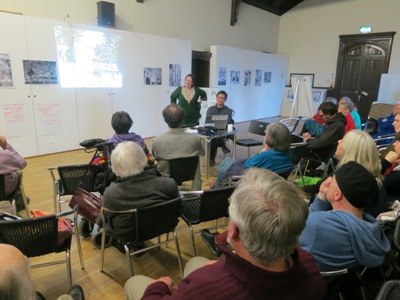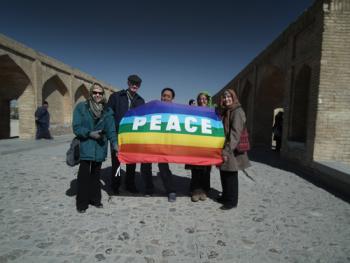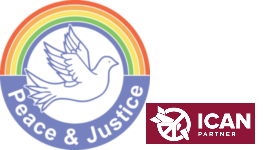Speaker Series Report, Tuesday 30th of April. Emily Johns and Milan Rai, editors of Peace News
Emily Johns: Experiences in Iran
The talk began with a brainstorm of what the average person on Prince’s Street’s preconceptions about Iran would be. Listed were Nuclear war/bomb makers, Oil, ancient culture, oppression of women, carpets/rugs, and spicy food. This was followed by the speaker’s story of her visit to Iran 7 years ago. Her family then were “weeping and wailing” about her going somewhere dangerous. Another preconception? Is it really that dangerous? The speaker questioned what it is about Iran that makes it and the preconception of it as somewhere dangerous. Status wise she compared it to Northern Ireland, where perceptions are of a dark, concrete and hostile environment. In reality Iran is green and peaceful, she said. Other countries such as China, Turkey and Saudi Arabia are probably more dangerous. She then introduced us to her illustrated work entitled ‘drawing paradise on the axis of evil’. While in Iran Emily drew a lot.
The word paradise is a Persian word, and comes from Iran. Iran is a country of ‘walled gardens in paradise’. There are many gardens of quadrants with ponds or a canal in the middle. These walled gardens date back 2500 years, and encompass the human vision of paradise, the four elements and a deep, rich symb olism of Iran from its long established culture (see below about poetry). Iran’s roots are in its gardens.
olism of Iran from its long established culture (see below about poetry). Iran’s roots are in its gardens.
However present day Iran has problems with pollution, and although much of the country is desert, the cultivation of plants is of key significance. Shiraz wine comes from Iran too, despite the fact that for the Muslim population a ban on alcohol applies. Other religious people in Iran can and do drink however.
The physical symbolism of the gardens is matched by the spoken/written symbolism of poetry, which is a massive part of Persian culture. In 2003 a terrible earthquake hit Iran. Much of the city of Bam collapsed. A 97 year old woman and a young boy were buried for ten days before being brought out alive. They ‘kept going’ by reciting poetry. It is part of the culture to have ‘enormous reservoirs’ of poetry. Hafiz was a love poet whose tomb has become a centre for internal tourism and pilgrimage, and people visit it reciting poems by Hafis and talking about relationships, love life and so on. People have an intense relationship with the tomb, the poet, and poetry. To give another example of the depth of Persian culture, 7 years ago president Ahmadinejad wrote to George Bush in a typically Persian style using layered and metaphoric language, a totally different way of expressing oneself than can be found in Western politics, and found that president Bush was baffled by it.
Milan Rai: Iran and Nuclear Weapons.
 Iran gets uranium ore out of the ground. Out of the ground the enrichment level of uranium is 0.7%. This is then converted to 5% which can be used for nuclear fuel. The 5% is then enriched to 20% which is the enrichment level appropriate for research reactors, where isotopes are generated for use in cancer treatment and diagnosis. 20% enrichment is at a ‘civil level’. The next step is 90% enrichment, which makes the uranium weapons grade. The conversion from 0.7% to 5% is a bigger jump (and therefore harder to achieve) than the jump from 20% to 90%. And Iran has already achieved that jump. At 20% weapons grade enrichment most of the work is done. Storing 240 kilograms of enriched uranium can easily be turned into a bomb. However, knowing this may pose a threat, when Iran gets 180kg of the stuff they turn it into oxide, thus taking it off the table. Israel has explicitly stated that they would attack Iran if they get to the 240kgs.
Iran gets uranium ore out of the ground. Out of the ground the enrichment level of uranium is 0.7%. This is then converted to 5% which can be used for nuclear fuel. The 5% is then enriched to 20% which is the enrichment level appropriate for research reactors, where isotopes are generated for use in cancer treatment and diagnosis. 20% enrichment is at a ‘civil level’. The next step is 90% enrichment, which makes the uranium weapons grade. The conversion from 0.7% to 5% is a bigger jump (and therefore harder to achieve) than the jump from 20% to 90%. And Iran has already achieved that jump. At 20% weapons grade enrichment most of the work is done. Storing 240 kilograms of enriched uranium can easily be turned into a bomb. However, knowing this may pose a threat, when Iran gets 180kg of the stuff they turn it into oxide, thus taking it off the table. Israel has explicitly stated that they would attack Iran if they get to the 240kgs.
In 2010 a deal which would have rid the world of a threat from Iran whilst simultaneously allowing Iran to get and use nuclear power safely was turned down by Iran. The deal was to swap 1200kgs of 5% enriched uranium (which Iran ships out) for 20% enriched fuel rods which can be slotted in for use as nuclear power but which cannot be used for making bombs. The conditions were that all 1200kgs had to leave the country in one go, and that they had to be received before the fuel rods were given out in return. Iran refused the deal, declaring a lack of trust of “the West” and a conviction to do it all themselves on home soil. Later, Brazil and Turkey attempted to build trust and confidence, but again Obama was unconvinced and stated his doubts about the exchange. However in May 2010 Iran accepted the swap deal from Brazil and Turkey, with enrichment being done on nearby Turkish soil. The UK and the USA reacted rather dismissively to this deal stating that 1200kgs was such a small amount that it was insignificant, seemingly belittling the deal Brazil, Turkey and Iran had worked hard to achieve and compromise. This attitude annoyed the Brazillian government in particular, seeing as the same deal was rejected when it came from other sources, namely the US and UK. Iran reacted to this humiliation and sense of being let down by going ahead and enriching to 20% themselves, claiming that this extra nuclear capacity would be used in ships, etc., while in reality this gave Iran bargaining power with the West by them offering to reduce their nuclear capacity in exchange for alleviation of sanctions.
In conclusion:
Although Iran’s track record of nuclear activity isn’t spotless, there is no evidence of nuclear weapons being used as weapons of war in Iran. Also, Iran have signed up to the Nuclear Non Proliferation Treaty, and other countries who have not may pose a more realistic threat, yet Iran is being targeted and victimised and punished with threats of war and sanctions. What has been done to address the issue more recently is a set up of an international consortium, where ownership of nuclear facilities from the top to bottom is monitored internationally, as a way to stop Iran from going to the 90% level of enrichment. This is seen as a safety measure by way of if Iran decides it doesn’t want the consortium on their soil anymore, this will be seen as a red flag by the international community, and that Iran might be making nuclear weapons. What Iran wants now is to become a nuclear threshold state, like Japan, with the capability of making nuclear weapons, but only a capability not to be actualised and not a step to be taken light-heartedly. There is nothing in the Nuclear Non Proliferation Treaty to prevent Iran from being a nuclear threshold state.
Notes taken and written up by Patrick Hawkes

